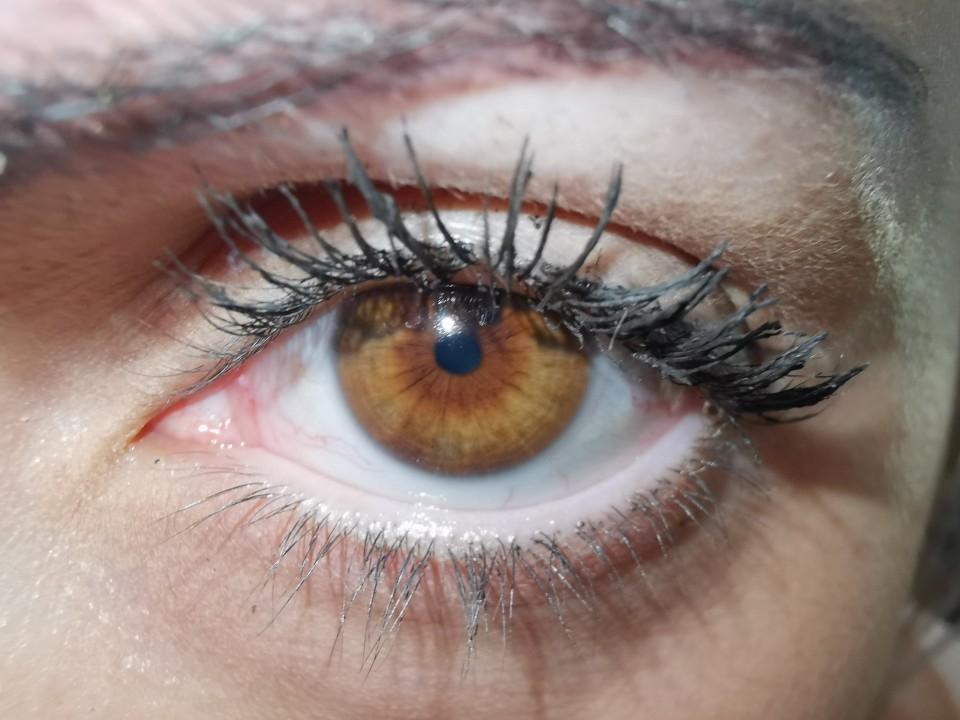Have you ever noticed a subtle shift in your eye color, or perhaps a friend’s, and wondered what could be behind it? It’s a captivating phenomenon that sparks curiosity and sometimes even a little anxiety. While it’s true that eye color is generally determined at birth, the fascinating truth is that adult eye color can change, albeit in often subtle ways. This article delves into the intriguing world of adult eye color changes, exploring the causes, mechanisms, and factors that contribute to this phenomenon.

Image: www.linkedin.com
Eye color, a characteristic often associated with our unique identity, is determined by the amount and distribution of melanin, a pigment, in the iris. Melanin comes in two forms: eumelanin, giving brown hues, and pheomelanin, contributing to lighter shades like blue, gray, and green. This complex interplay between melanin and light scattering within the iris creates what we perceive as eye color. While your eye color sets in during childhood, it can be influenced by various factors throughout your life, including genetics, age, and even health conditions.
The Intricacies of Adult Eye Color Change
Contrary to what some believe, adult eye color change isn’t a magical transformation that magically turns your brown eyes blue overnight. Instead, these changes are often subtle shifts in hue, brightness, or even the appearance of patterns within the iris. While intriguing, these alterations are rarely dramatic or sudden. Let’s explore some of the most common causes behind these gradual shifts in adult eye color:
1. Ageing and Melanin Production
As we age, our bodies undergo various physiological changes, and melanin production is no exception. The production of melanin, including in the iris, can decline with age. This decline can lead to a gradual lightening of eye color, especially in individuals with darker eyes. Some may notice their brown eyes becoming slightly lighter brown or even taking on a greenish tinge. This lightening process is attributed to the reduction in eumelanin, the pigment responsible for brown and black hues.
2. Hormonal Fluctuations
Hormones play a critical role in various bodily functions, including melanin production. Shifts in hormonal levels, particularly during pregnancy, puberty, or menopause, can influence iris pigmentation. During pregnancy, increased estrogen levels can temporarily darken eye color in some women. Conversely, fluctuations in hormone levels during menopause may cause a slight lightening of eye color. These changes are often temporary and tend to revert back to their original state over time.

Image: www.reddit.com
3. Environmental Factors
Sunlight, the major source of vitamin D, can have a surprising impact on eye color. While prolonged exposure to UV rays can damage the eyes, it can also cause a temporary darkening of the iris. This phenomenon is attributed to the iris’s natural defense mechanism, where increased melanin production acts as a protective shield against harmful UV radiation. However, this darkening effect is often temporary and fades once exposure is reduced.
4. Injury, Trauma, and Surgery
Eye injuries or trauma, such as blunt force trauma or surgical procedures, can alter eye color due to changes in the iris itself. For instance, a severe eye injury might lead to a partial or complete loss of pigmentation, resulting in a lighter eye color. Similarly, eye surgeries, particularly those involving the iris, can influence pigment distribution and, consequently, eye color perception. The level of change depends on the severity of the injury or the nature of the surgery.
5. Medical Conditions
Certain medical conditions, like Horner’s syndrome or pigment dispersion syndrome, can manifest through changes in eye color. Horner’s syndrome, a condition affecting the sympathetic nervous system, can cause a change in eye color by impacting the function of the iris muscles. Similarly, pigment dispersion syndrome, characterized by the release of pigment granules from the iris, can subtly alter eye color and occasionally lead to a grayish hue.
6. Medications
Some medications, particularly those affecting the autonomic nervous system, can influence eye color. Medications like anticholinergics, which affect muscle function, can cause a temporary change in eye color due to their effects on the iris. These changes are usually transient and usually disappear once the medication is discontinued.
7. Genetics and Ethnicity
Genetics plays a crucial role in determining eye color, but it’s not the only factor influencing changes later in life. Predispositions towards certain eye color changes, whether lightening or darkening, can be inherited. Similarly, ethnicity can influence eye color variations. Different ethnicities tend to have different frequencies of specific genes responsible for eye color, leading to variations in how eye color changes throughout life.
Expert Insights and Actionable Tips
Understanding that adult eye color change is often a natural, albeit subtle, phenomenon is key to alleviating any anxieties surrounding the process. If you notice any significant or sudden changes in your eye color, consulting an ophthalmologist is crucial. They can help rule out any underlying medical conditions or assess any potential complications. Here are some actionable tips from experts:
- Embrace the natural process: Remember that slight changes in eye color with age are often entirely normal and usually pose no health risks.
- Stay hydrated: Adequate hydration is crucial for maintaining overall health, including the health of your eyes.
- Protect your eyes from UV rays: Wear sunglasses that offer 100% UV protection to safeguard your eyes from harmful radiation.
- Maintain a healthy lifestyle: Eating a balanced diet and exercising regularly can contribute to overall health and potentially influence eye health as well.
What Causes Eye Color Change In Adults
Conclusion
The question of why adult eye color can change is a fascinating exploration into the intricate workings of the human body. While these changes are often subtle and naturally occurring, it’s essential to be aware of potential medical conditions that might be associated with more dramatic shifts in eye color. By understanding the underlying causes and observing the changes in your eyes, you can embrace the uniqueness of your own journey and, when needed, consult a medical professional to ensure your eye health is well taken care of. Embrace your ever-evolving eyes and celebrate the beauty of a lifetime of subtle transformations.






